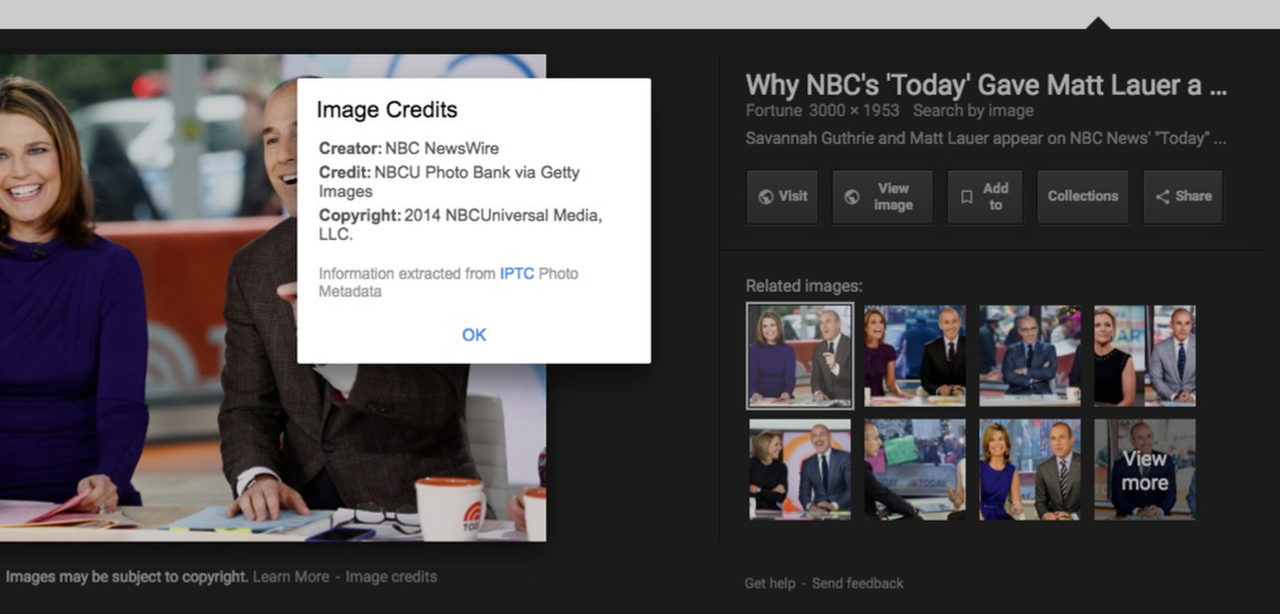
With copyright metadata now supported in Google Images, the time to update your website to respect metadata is… now
Google has begun actively surfacing copyright metadata on Google Images. Now that the Copyright field itself is working, users can see all three of the IPTC fields Google promised a few weeks ago. What does this mean for website operators?
It means that, if you haven’t already, you should make sure your site respects metadata on images.
If you haven’t already, you should, ah… encourage your content contributors to put their names on their work.
“It means that” sounds kind of sweeping. It kind of sounds like when Google says you should do something, it “means” do it. As opposed to just having a bunch of good reasons to do something, which might not really “mean” we should get our butts in gear. Well, yeah. In the web world, it’s pretty much like that. I’ll fess up. Just being honest here.
What Google really did was just to throw another log on a pretty decent size bonfire of reasons why metadata matters to you. Make that a log and a gallon of lighter fluid. We are talking Google here. The extra heat means it’s time to act.
Why bother – logs already on the fire
Karma.
Readers of this blog already know that respecting metadata is good karma.
Images on your site will go viral. They will end up on Google Images and they will be appropriated right off your pages.
When that happens, good metadata helps good honest people be good honest people. Maybe that means enabling somebody to contact one of your content providers to buy a reuse license. Or maybe it means that some soul who was contemplating stealing is reminded that the property they were about to boost belongs to somebody and they better keep their fingers off it. Either way, it’s still good.
Wow. Metadata saves person from life of crime. Whodda thought. Don’t get me wrong here. I like lawyers. And lawyers gotta eat. I just don’t want them eating me.
Metadata, in the form of a caption, helps a photo become part of our culture, instead of digital refuse. Most photos mean something only so long as we know what is being depicted in them. A hundred years ago, we knew to write that sort of thing on the back of a print with a pencil. Now, that seems beyond our technology. But on your site, the pencil can once again be mightier than entropy.
There’s a karmic watershed to be on the right side of! Particularly considering that being on the right side doesn’t cost anything.
Then there’s the legal stuff
We know that if, excuse me… when, one of our contributors get infringed, that copyright notice that you respected on their work can only help them in their (uphill, unfortunately) struggle.
And we do need to think about protecting the most important businesses in the whole economy – our own!
Destroying copyright management information – like, basically, all the information we find in IPTC metadata – is illegal. And the consequences can be devastating. That said, it’s not as though (as much as I wish) the copyright police are likely to crash through the window and slap the lawsuit cuffs on metadata violators. Not in the US, anyway. Yet.
But what is likely – you can count on it, in fact – is that when somebody infringes on a copyright, if copyright management information is destroyed, the plaintiff will tack $2,500 to $25,000 of statutory damages – per picture – onto their lawsuit.
Ouch
I know. You would never, ever, infringe a copyright. So, you’re thinking, “Why would this matter to me?” Because what you mean is that you would never, ever, intentionally infringe a copyright. In today’s world, most of us are at peril of accidentally infringing somebody more or less every day. We use content from all sort of sources – company marketing departments, dodgy stock photo sites, our cousin Louie, and kind souls who give us, out of the goodness of their hearts, stuff that hopefully is really theirs to give.
Respecting metadata isn’t going to save us from that nice marketing person at WidgetCo who’s handing out pictures without a license to do so. But if Murphy’s Law bites, it can at least save us from throwing raw meat in front of a hungry lawyer. (Don’t get me wrong here. I like lawyers. And lawyers gotta eat. I just don’t want them eating me.)
Not bothering, well, just isn’t good
Then there are – apart from pure inertia- arguments for not bothering.
I hear all the time from people who say, “I only use my own content and I don’t really care about protecting my copyrights. I don’t care if my stuff gets stolen. So I don’t worry about metadata”
OK, so there are two issues here.
First, there’s self-interest, a simple cost-benefit tradeoff. You may not get a business lead because somebody saw your contact information on a photo every day. But considering the cost of doing the right thing for metadata is essentially zero, if you ever get even a smidgen of benefit, you’re to the good.
The bigger thing is how respecting metadata on your site will affect others. When you empower honest people, you’re empowering honest people generally, not just in regard to your own work.
Every time somebody sees that some real person owns a work and comes one step closer to understanding that they need to respect others’ property, we all benefit.
Don’t pollute
An image that has vital information – what’s shown in it and who made/owns it – becomes part of our culture. On the other hand, images sundered from that information just become internet pollution. People are more likely to behave in a healthy way in a cleaner environment.
So, whether or not you’re concerned about a threat to your own work, it still matters. Configuring your site to respect metadata is a pay-it-forward move.
And now, on top of all of that, we have:
Google wants us to.
So, it’s time.
Configuring your website to respect metadata is easy. For most sites, it simply means making sure that ImageMagick is selected as the imaging library and letting ImageMagick’s default settings take care of the rest. See this post, and this one, and this one. Search “ImageMagick” on this site’s search page to find out more.
I said that respecting metadata costs nothing. What I mean by “nothing”, as it applies to website operators, is that the presence or absence of metadata on images won’t affect page load times perceptibly. Watch for an upcoming post wherein we’ll look at metadata and page load times.
